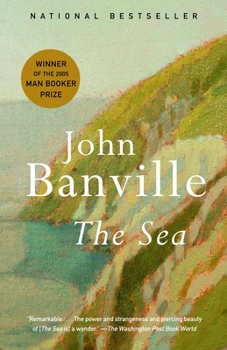The Sea
Select Format
Select Condition 
Book Overview
BOOKER PRIZE WINNER - NATIONAL BESTSELLER - An "extraordinary meditation on mortality, grief, death, childhood and memory (USA Today) about a middle-aged Irishman who has gone back to the seaside to grieve the loss of his wife.
In this luminous novel, John Banville introduces us to Max Morden, a middle-aged Irishman who has gone back to the seaside town where he spent his summer holidays as a child to cope...
Format:Paperback
Language:English
ISBN:1400097029
ISBN13:9781400097029
Release Date:August 2006
Publisher:Vintage
Length:208 Pages
Weight:0.51 lbs.
Dimensions:0.6" x 5.2" x 8.0"
Customer Reviews
8 ratings
Beautiful words but no plot
Published by Fromanovelist , 1 year ago
Although I love beautifully novels, they also need some kind of arresting story line to hold my attention. I was disappointed. I just could not get into this one.
beautiful words... not a beautiful outlook
Published by woman , 2 years ago
This book is beautifully written, but the way it talks about women made me so uncomfortable that I could not finish the book.
Short book. Long read.
Published by Salvanv , 3 years ago
You’d better enjoy vocabulary and long long descriptions. This book is more about writing than story.
Shockingly beautiful
Published by Thriftbooks.com User , 17 years ago
From the opening sentence to the closing paragraph, Banville produces a masterful literary conundrum. The Sea is a brief and disarmingly subtle story, peopled with timeless and ethereal characters, delivered in shockingly beautiful prose. This story shares, in its own realm, the naively sinister awakenings of the young in The Ripening Seed (Le Blé en Herbe), one of Colette's later novellas, albeit a far more primitively written and translated work than The Sea. Banville takes unprecedented but thoroughly justified liberties with the English language, turning it inside out and leaving it - and the reader - gasping for breath. Banville is the real thing, a poet of the calibre of his fellow countryman, Seamus Heaney. I have read this novella three times, given it away three times, and will doubtless continue to do the same. Some works are meant to wake us up from our aesthetic slumber. This is one of them.
A Beautifully Written Novel
Published by Thriftbooks.com User , 18 years ago
There is no doubt that The Sea is an excellent story. John Banville pieces together broken memories and weaves these stories with the present. The protagonist Max returns to the Seaside where he spent much of his childhood. Throughout his time there the picture of the past becomes more complete and better connected to the present. It is truly a gradual uncovering of a story; not so much a mystery, but a novel which fills the reader with questions. The fact that this novel is so excellent cannot be attributed to the story itself, but to the strength of the prose as well. The rich language is always used to convey some important idea: "Happiness was different in childhood. It was much then a matter simply of accumulation, of taking things--new experiences, new emotions--and applying them like so many polished tiles to what would someday be the marvelously finished pavilion of the self." The only downside to this book is that it can be slow at times. This concern aside, the story is worth the read if you have grown tired of dime store thrillers and you seek something of substance.
Real Literature
Published by Thriftbooks.com User , 18 years ago
Books like this are a dying breed. Banville was half expecting his manuscript of 'The Sea', his 14th novel, not to be published at all after a long back catalogue of novels that only sold two to three thousand copies apiece. He was known as a difficult and wordy prose stylist, totally obscure. Then in October last year 'The Sea' won the Booker prize, guaranteeing it instant media attention, and several critics claimed the choice of winner would ruin the status of the Booker indefinitely, given its verbosity, its lack of plot, its supposed inaccessibility. The Sea sits firmly in that quiet, reflective erudite continental tratition of intelligent literature - early Nabokov, Proust, some Joyce, Beckett. There is very little dialogue. It achieves its affect by a slow, drip of meditative prose craft. The narrator, Max Morden, is an almost post human entity, a ghostlike man, focusing his attention intently on the aesthetic details around him and his memories of the past at the Irish seaside town he revisits. Some of the details are conjoured up beautifully, a wet swimming costume, for instance 'lying where she had tossed it, limply wadded and stuck along one wet edge with a fringe of sand, like something thrown up drowned out of the sea.' Some of the details are beautifully evoked, but come across as rather strainingly artificial, try this: 'The steel milk churns looked like squat sentries in flat hats, and each one had an identical white rosette burning on its shoulder where the light from the doorway was reflected.' Does reflected light really shine like a rosette? It is, nevertheless, a beatifully crafted image. Some of the imagery I did find too false, especially Banville's over attatchment of the colour blue to things. Is mud really blue? Is smoke in a room really blue? Banville is also a stylist who deals with language, he loves the shape, the sound, the formation of words. Much of the vocabulary is arcane - 'cracaleured', 'ichor', 'cinereal' anyone? I referred to my OED frequently throughout. However this is not the pretentious thesaurus abusing of some other contemporary wannabe literary novelists. Banville really is an experienced master with his self proclaimed 'Hibo-English' and readers who take the time to absorb the patterns and thoughts he evokes on the page will find it a treat. Many people will pick up this novel, fail to see what all the fuss is about, and return to their familiar slush piles of middle brow fiction. However the prestige attatched to 'The Sea' has deservedly raised Banville's profile, for so long underrated, in the literary world. The Sea is his best novel so far and he has reached the peak of his powers as a prose stylist. It is a shame that his next novels are apparently to be pulp detective fiction written under the pseudonym 'Benjamin Black'.
The Beauty Of Language
Published by Thriftbooks.com User , 19 years ago
Once in a while a novelist totally captures the reader with his exquisite, finely wrought language. John Banville in THE SEA, the recent winner of the Booker Prize, is just such a writer. If you are not careful, you will be so taken by the beauty of his words, that you may miss the nuances of meaning so important to fitting all the parts of his story together. The narrator is Max Morden, an Irishman who a year after the death of his wife, returns to a town by the sea where he spent his summers over 50 years ago and fell under the spell of the Grace family, composed of the mother, father and twins: Chloe and Myles, a strange young lad who has never spoken. In a style reminiscent of Proust, Thomas Mann, Henry James and the best of Edmund White, Banville's narrator goes from the summers in the past to the recent "plague year" of his wife's terminal illness to the present where he rents a room in the Cedars, where once the Graces lived, and is now inhabited by the mysterious Miss Vavasour, the current landlady, and her only other tenant, the Colonel. You can open the book to almost any page and read beautiful, poetic language. On our memories of our youth: "So much of life was stillness then, when we were young, or so it seems now; a biding stillness; a vigilance. We were waiting in our as yet unfashioned world, scanning the future as the boy and I had scanned each other, like soldiers in the field, watching for what was to come." Or on Banville's description of the sea: "Down here, by the sea, there is a special quality to the silence at night. I do not know if this is my doing, I mean if this quality is something I bring to the silence of my room, and even of the whole house, or if it is a local effect, due to the salt in the air, perhaps, or the seaside climate in general." I would have been content if this novel had just been about Morden's musings on first love, the inexactitude of memory, the taking care of and losing in death of a wife far too early, the mild sorrow of what he might have done differently-- he opines that if Bonnard, the artist whom he is attempting to write about, didn't have all the answers then neither should he: "Why should I demand more veracity of vision of myself than of a great and tragic artist? We did our best, Anna [his wife] and I. We forgave each other for all that we were not." Many a decent writer would have let it go at that. Banville does not. In the last few pages of this small novel, he delivers at least three body blows that the reader-- at least this one-- was not prepared for. Looking back, I see that the writer does drop clues along the away about the possible ending. Read carefully or Mr. Banville will take your breath away.
Lovely Proustian reverie at under 200 pages
Published by Thriftbooks.com User , 19 years ago
Much of the criticism of this wonderful book accuses Banville of being pretentious, his language overblown. But that is to miss the point of the style. Mr. Banville respects his readers and doesn't dumb down his prose. His narrator Max uses obscure words because he is a writer and is himself fascinated by words. In one case, almost as an aside, Max admires a particularly well used word. Like Graham Swift, Banville makes the reader stretch his mental muscles. And get rewarded. This book is a reverie, an internal meander through the past, near and far. The present kindles memories of his recent devastation, which leads to a pivotal summer from the past, which leads to his family's history, which leads back to the present. And with a logical twist in the final pages. I loved this book and was so glad when it won the Booker. He was due.
The Sea Mentions in Our Blog

13 of the Best New Novels by Irish Authors
Published by Ashly Moore Sheldon • March 17, 2021
To celebrate St. Patrick's Day, we wanted to applaud some of the most exciting Irish novelists of the moment. With forefathers like James Joyce, Oscar Wilde, and Samuel Beckett, these up-and-coming bards have some big shoes to fill, and they're doing brilliantly!







